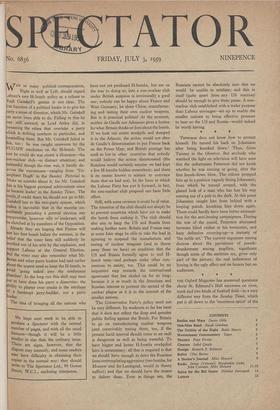W HY so many political correspondents, Right as well as Left,
should regard
abour's new H-bomb policy as a tribute to ugh Gaitskell's genius is not clear. The rat function of a political leader is to give his arty a sense of direction, which Mr. Gaitskell as never been able to do. Failing in this he ay still succeed, as Lord Attlee did, in oreseeing the crises that overtake a party which is drifting nowhere in particular, and forestalling them. But Mr. Gaitskell failed in this, too ; he was caught unawares by the NUGMW resolution on the H-bomb. The best he could do was create a diversion—the non-nuclear club—to distract attention; and successful though the ruse was, it hardly de- serves the encomiums—ranging from `Tri- umphant Hugh' in the Sunday Pictorial to Make no mistake about it, for Mr. Gaitskell this is his biggest personal achievement since he became leader' in the Sunday Times. The credit, if credit there be, should not go to Mr. Gaitskell but to the two-party system, which makes it inevitable that in the months im- mediately preceding a general election any comprotnise, however silly or irrelevant, will be clutched at by members of the Opposition.
Already they are hoping that France will test her first bomb before the autumn, in the belief that the voter here will suddenly be terrified out of his wits by the explosion, and support Labour at the General Election. But the voter may also remember what Mr. Bevan and other party leaders had said earlier about the urgent need to keep the H-bomb, to avoid 'going naked into the conference chamber'. In the long run this shift may turn out to have done his party a disservice: the ability to plaster over cracks is the attribute of a bankrupt jerry-builder, not a party
leader.
The idea of bringing all the nations who have not yet produced H-bombs, but are on the way to doing so, into a non-nuclear club under British auspices is intrinsically a good one; nobody can be happy about France and West Germany, let alone China, manufactur- ing and testing their own nuclear weapons. But is it practical politics? At the moment, neither de Gaulle nor Adenauer gives a button for what Britain thinks or does about the bomb. If we took our entire stockpile and dumped it in the Atlantic, the action would not alter de Gaulle's determination to put France back on the Power Map; and British prestige has sunk so low in other countries that nobody would believe the action disinterested (the Russians would certainly assume we had kept a few H-bombs hidden somewhere; and there is no means known to science to convince them that we had not). In the form in which the Labour Party has put it forward, in fact, the non-nuclear club proposal can have little effect.
Still, with some revision it could be of value. The intention of the club should not simply be to prevent countries which have yet to make the bomb from making it. The club should also aim to keep the US and Russia from making further tests. Britain and France may at some later stage be able to take the lead in agreeing to suspend the manufacture and testing of nuclear weapons (and to throw away those we have) on condition that the US and Russia formally agree to end H- bomb tests—and perhaps make other con- cessions to sanity, too. This could be an important step towards the international agreement that has eluded us for so iong; because it is as much in the American and Russian interest to prevent the spread of the nuclear plague as it is in the interest of the smaller nations.
The Conservative Party's policy need not be very different. Its weakness so far has been that it does not reflect the deep and genuine public feeling against the Bomb. For Britain to go on manufacturing nuclear weapons (and conceivably testing them, too, if the present lucid interval should come to an end) is dangerous as well as being wasteful. To have bigger and better H-bombs stockpiled here is unnecessary: all that is required is that we should have enough to deter the Russians from contemplating aggression (two bombs, for Moscow and for Leningrad, would in theory suffice); and that we should have the means to deliver them. Even as things are, the Russians cannot be absolutely sure that we would be unable to retaliate; and this in itself (quite apart from any US reaction) should be enough to give them pause. A non- \ nuclear club established with a wider purpose than Labour envisages—set .up to enable the smaller nations to bring effective pressure to bear on the US and Russia—would indeed be worth having.






























 Previous page
Previous page